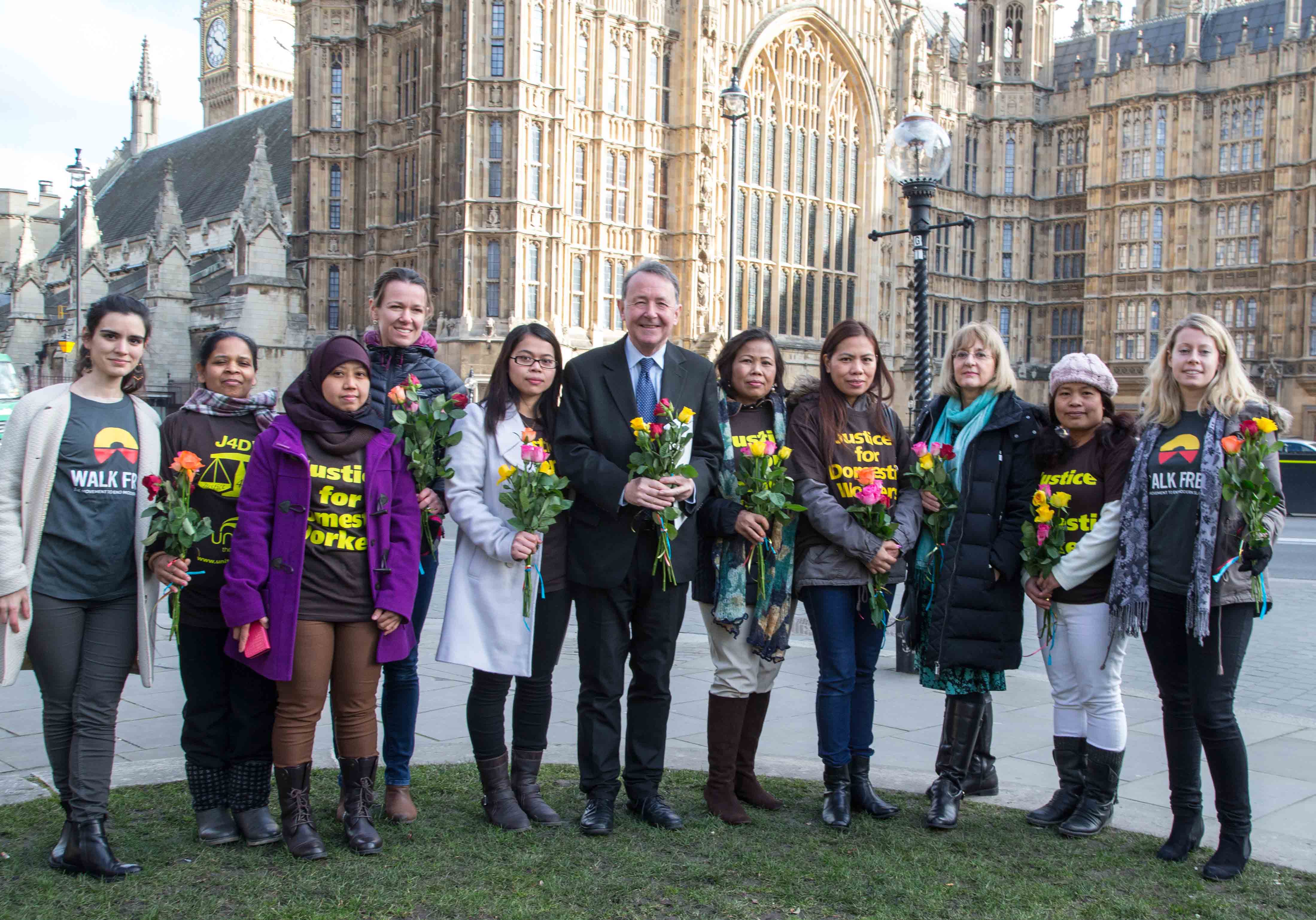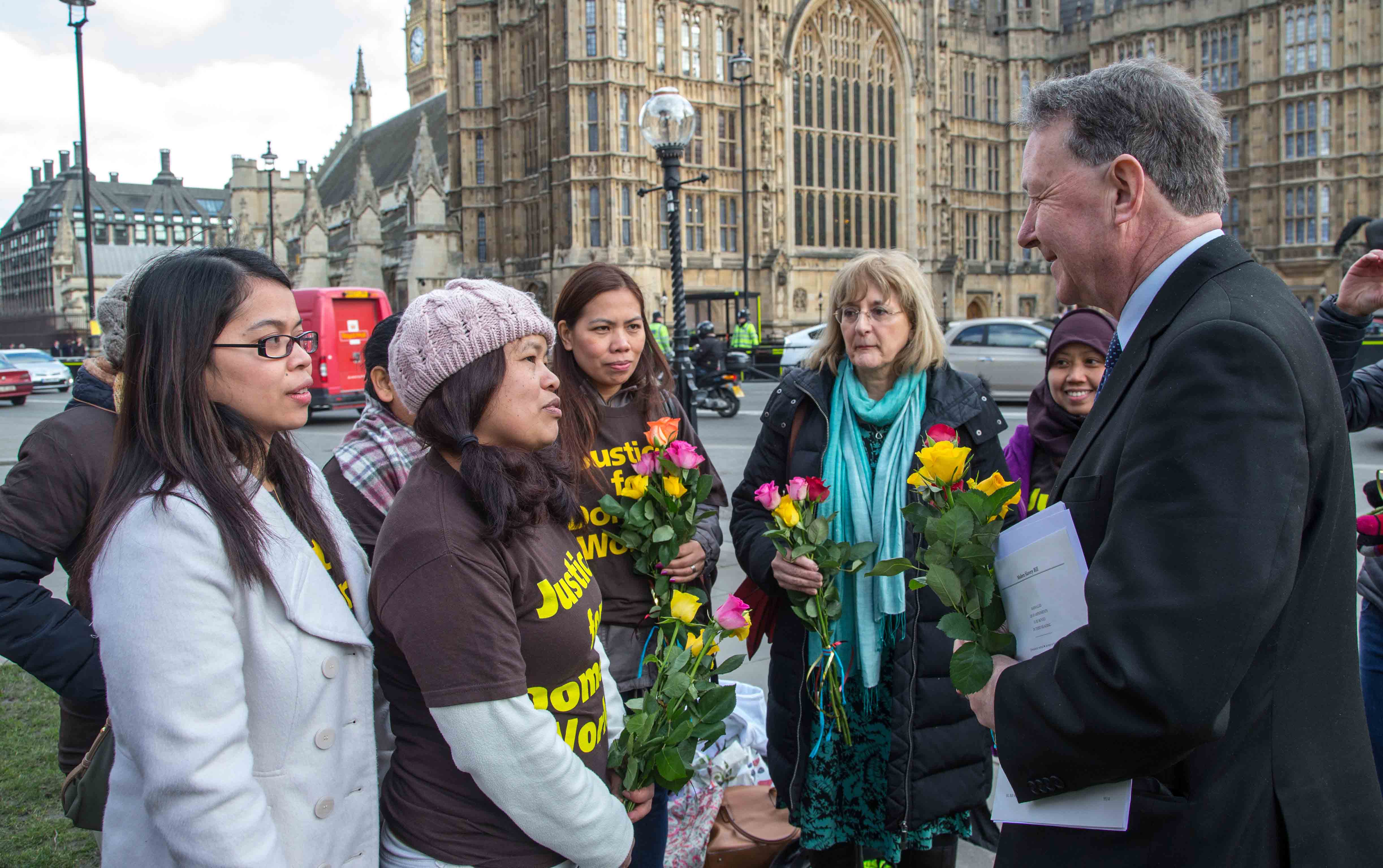House of Lords votes down amendment to provide greater protection for domestic migrant labour:
Full debate:
http://www.publications.parliament.uk/pa/ld201415/ldhansrd/text/150325-0001.htm#15032588000969
For background see:
25 Mar 2015 : Column 1438 4.30pm
Lord Alton of Liverpool (CB): My Lords, like the noble Baroness, Lady Hamwee, I would like to make a number of points about Motion A1, which my noble friend has laid before your Lordships’ House. In doing so, let me say first to my noble and learned friend Lady Butler-Sloss that she has been involved in the drafting of this legislation, as she said, even before it was presented as a Bill. However, on Report I passed an article to my noble friend Lord Hylton that he had written in 1996, and which I had kept, about the importance of safeguarding domestic migrant workers. No one has done more in your Lordships’ House than my noble friend Lord Hylton to champion their cause. That is why the noble Lord, Lord Bates, was right to pay tribute to him.
Although this risks becoming like a mutual admiration society, I join with the noble Baroness, Lady Royall, in congratulating the Minister on the exemplary way that he has handled the Bill. It has, throughout, been a bipartisan Bill—the Opposition have played a huge part in it, as have people from all Benches in your Lordships’ House—and a bicameral Bill, with a lot of interaction between both Houses. The right honourable Member for Birkenhead, Frank Field—we all wish him well as he recovers from his recent
25 Mar 2015 : Column 1439
heart attack—chaired that important committee on the draft Bill. He is right to emphasise the totality of this Bill.
There is no one in your Lordships’ House, including my noble friend, who will put this Bill at risk in any way whatever, but making a good Bill even better is surely what Parliament is all about. We have made this provision better. I will come back to that in a moment, but it is worth pointing out that supply chain transparency, which my noble and learned friend referred to, was not even in the Bill after the pre-legislative scrutiny stage in another place; it was incorporated on the Floor of the House. Similarly, there was no provision in the Bill on domestic migrant labour when it began to go through its stages. We have been improving it as we have proceeded. The Minister will correct me, but I think in Committee and on Report—I was able to take part in all stages of the Bill—around 100 amendments, many of them emanating from the Government after the discussions we had in the meetings that the noble Lord organised for us, were incorporated into the Bill. That is why it is already so much better than when it began.
I take issue a little with my noble and learned friend. It is the job of parliamentarians to be here until Parliament is dissolved. We have not got to the last gasp; this is not Custer’s last stand, as she put it. I certainly do not regard people laying amendments before your Lordships’ House and giving them proper consideration, as we are doing, as blackmail. I think it unreasonable to suggest that. I ask the Government this in that context: why is it that an amendment that was incorporated on domestic migrant labour about a week ago in another place has taken so long to come back to your Lordships’ House? Why is it here on the penultimate day? Why could it not have been here on Monday, for instance, allowing for more consideration if time is really the issue?
As the noble Baroness, Lady Royall, rightly said, there is plenty of time for this to go to another place tonight. I have served in one or other of these Houses for the last 36 years. As the noble Baroness said, I remember the so-called wash-ups where we were here all night long dealing with things going between the two Houses until we got it right. Often, we got it much better as a consequence. I think back to the LASPO legislation. I moved an amendment concerning the legal aid provisions for people who had contracted mesothelioma. Your Lordships, across the House, were good enough to support it and it ping-ponged back and forth between both Houses. On the third time of asking, the Government relented and modified the legislation. That is our duty as parliamentarians: to seek as much as we can get and to recognise the moment when no more can be gained. I am sure that my noble friend, who has been in your Lordships’ House for a lot longer than I have been, will be able to remind your Lordships of plenty of such precedents. If we are here tomorrow again debating an amendment and the Commons decide that they do not wish to modify Motion A but wish to persist with it, then we will no doubt hear from the noble Lord what he wishes to do.
25 Mar 2015 : Column 1440
I turn briefly to the substance of the amendment. Until we incorporated this new clause, the Bill contained nothing whatever to address the tying of migrant domestic workers to their employers. On two occasions in the last three weeks I have met domestic migrant workers on Cromwell Green, and I know that other Members of your Lordships’ House have done so too. They were brought here by the Kalayaan charity, which the noble Baroness referred to. They told me that when news of the vote in your Lordships’ House on my noble friend’s amendment was announced, a young woman called Marissa Begonia, herself a domestic worker and co-ordinator of the self-help group Justice 4 Domestic Workers, described how she received texts from workers asking her, “Am I free now?”. Unfortunately, of course, the answer is “Not yet”. However, I recognise that the Minister has gone some way today, particularly in what he said about the review, but that review can now take place anyway, regardless of what we decide regarding this amendment. These things are not mutually exclusive.
In a nutshell, the government amendment does not provide additional protections against exploitation. Once someone is trafficked, it forces them to go to the police without any guarantee of protection before they do so. One employment agency told me that it would not place someone on a six-month visa with no hope of renewal. As the noble Baroness, Lady Royall, said, there is a real risk that it could drive people underground—again, with no access to things such as legal aid.
My noble friend’s amendment merely asks for the most basic of protections, and they are threefold: first, to change employer but remain restricted to domestic work in one household; secondly, if in full-time work as a migrant domestic worker in a private household, the option to apply to renew the visa; and, thirdly, in instances of slavery, a three-month visa to allow the workers to look for decent work. Without these kinds of provisions, we leave in place a system found repeatedly during almost three years to facilitate exploitation, including trafficking of migrant domestic workers.
Many workers coming to Kalayaan describe how they have “sacrificed” themselves for the well-being of their wider family. They do not self-protect in the way that someone with more choices would expect. Many explain that they are prepared to put up with practically any amount of mistreatment if they can provide for their children and ensure that the same will not happen to them.
In 2009, the Home Affairs Select Committee, in its inquiry into trafficking, said that the visa issue was,
“the single most important issue in preventing the forced labour and trafficking of such workers”.
No one is so naive—I agree with the noble Lord, Lord Bates—to suggest or imagine that the exploitation of domestic workers would be abolished by such minimal protections, but they would certainly be an improvement on the current situation. The Minister referred to the anti-slavery commissioner designate, Kevin Hyland, and said that he did not feel that this went far enough. Well, he is right about that, so let us at least go as far
25 Mar 2015 : Column 1441
as these amendments and as far as we can by regulation in due course, but let us do as much as we can for the moment.
When the Minister comes to reply, can he say whether the measures might include provisions—maybe as a result of the review—for annual inspections, for checks with the Inland Revenue to ensure that employers have registered and are making reasonable levels of contributions, and for annual meetings between the worker and a trusted authority? All those will be crucial. I believe that my noble friend is right to have laid this amendment before your Lordships’ House and I do not think that it is a question of this being Custer’s last stand. I hope that, from my noble friend’s point of view and because of all the things that he has done in raising this issue in the past, we will continue to give him our support if he chooses to press the matter to a Division.



